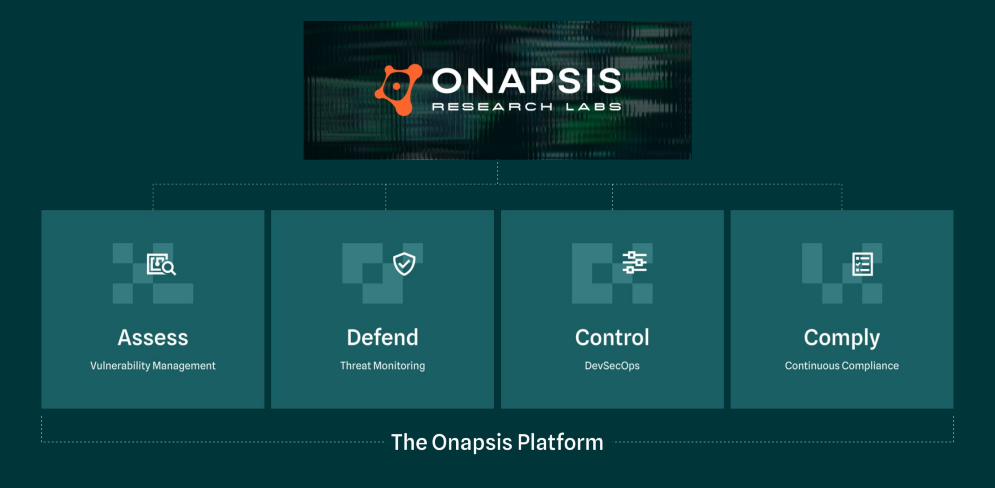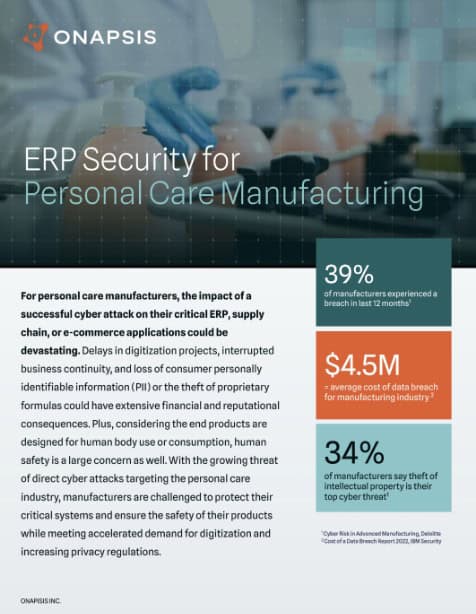For personal care manufacturers, the impact of a successful cyber attack on their critical ERP, supply chain, or e-commerce applications could be devastating.
Delays in digitization projects, interrupted business continuity, and loss of consumer personally identifiable information (PII) or the theft of proprietary formulas could have extensive financial and reputational consequences. Plus, considering the end products are designed for human body use or consumption, human safety is a large concern as well. With the growing threat of direct cyber attacks targeting the personal care industry, manufacturers are challenged to protect their critical systems and ensure the safety of their products while meeting accelerated demand for digitization and increasing privacy regulations.
Key Risk Factors
Direct ERP Attacks on the Rise
Cyber attacks targeting the personal care industry are on the rise. Successful attacks on ERP systems can be particularly devastating, with the potential to disrupt supply chains, interfere with product safety and delivery, interrupt e-commerce, and result in loss of consumer PII or company IP (e.g., product formulas.)
More Digitization and Interconnectivity
COVID-19-induced supply chain instability and shifting consumer expectations are driving a need for more digitization and interconnectivity between business processes and systems, so organizations can be more resilient and respond more quickly to changing supply and demand.
Expanded E-Commerce and Digital Sales
As more personal care manufacturers go direct-to-consumer or enhance their e-commerce experiences to address evolving market demand, protecting consumer PII must be top of mind. Failure to do so could result in significant financial loss due to reputation damage or compliance violation (e.g., GDPR, CCPA.)
Key Challenges to ERP Security
Security Is Often an Afterthought in Digital Transformation
The need for supply chain digitization and innovative, integrated e-commerce solutions is driving digital transformation at unprecedented speed, often at the sake of security. The tendency has been to bolt on security after the fact, which can lead to unaddressed risk, project delays, and cost overruns.
Under-Resourced Teams
Workforce shortages, particularly in cybersecurity, mean teams must balance high priority digitization initiatives with ensuring resiliency and integrity of ERP, e-commerce, and supply chain systems and data. This can be particularly challenging since many security teams lack experience with these systems.
Limited Visibility for Security Teams
Limited or restricted visibility into ERP applications and assets across complex and interconnected landscapes results in the inability to effectively protect systems supporting digital supply chains, e-commerce, and other business-critical operations, as well as the data contained within.

Solution
Onapsis Provides a Better Approach to ERP Security
Fortunately, securing your complex ERP landscape doesn’t have to be complicated, even with all the advanced threats and attacks out in the wild.
That’s where Onapsis comes in.
As the undisputed experts in business application security with the most prolific threat research team for SAP and Oracle, Onapsis has been on the frontlines securing the world’s leading personal care manufacturers for over a decade now. We’re proud to be an Oracle partner and the only application security platform in the SAP Endorsed Apps program.
With Onapsis, you get complete 360 degree security for your critical ERP applications, helping you:
- Automate security, so you can avoid delays and audit findings and focus on core transformation tasks, while ensuring your critical systems and data stay protected
- Gain research-driven analysis and focused threat intel from industry experts, so even teams new to ERP can quickly and effectively understand and act on risk
- Integrate with ticketing systems and SIEMs, so ERP can be brought into existing processes and SOC playbooks
F250 Case Study
F250, $17B Consumer Products Manufacturer Gains Visibility into SAP Attack Surface, Automates GDPR Audit Processes to Reduce Risk to Critical Systems
Challenge
There was a board-level initiative to secure SAP with a key focus around mitigating risk related to GDPR requirements and compliance. The CISO knew their security operations team didn’t have the visibility or tools they needed to secure SAP, and their existing manual audit processes were too time-consuming and left too much room for human error to effectively manage GDPR risk.
Solution
With Onapsis, comprehensive vulnerability scans provided much-needed visibility into the broader attack surface across the complex SAP landscape, allowing the security operations team to better comprehend, prioritize, and quickly respond to threats. Onapsis helped the manufacturer automate the majority of their efforts around testing IT controls and collecting evidence for GDPR audits, saving significant time and enabling them to find issues ahead of third-party audits.
Learn more about how Onapsis helps personal care manufacturers protect the systems and data supporting their ERP, digital supply chains, e-commerce, and other business-critical operations at onapsis.com/personal-care
Reference
1 Cyber Risk in Advanced Manufacturing, Deloitte
2 Cost of a Data Breach Report 2022, IBM Security

